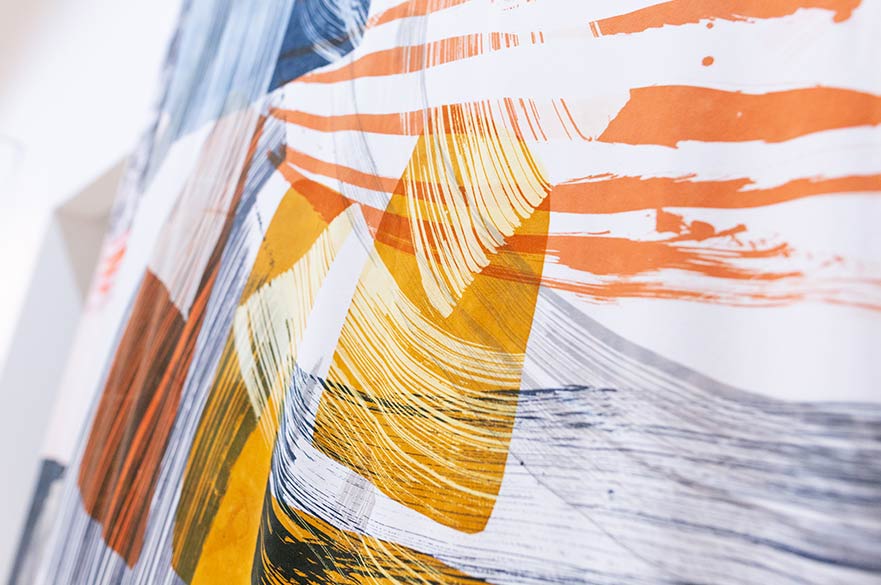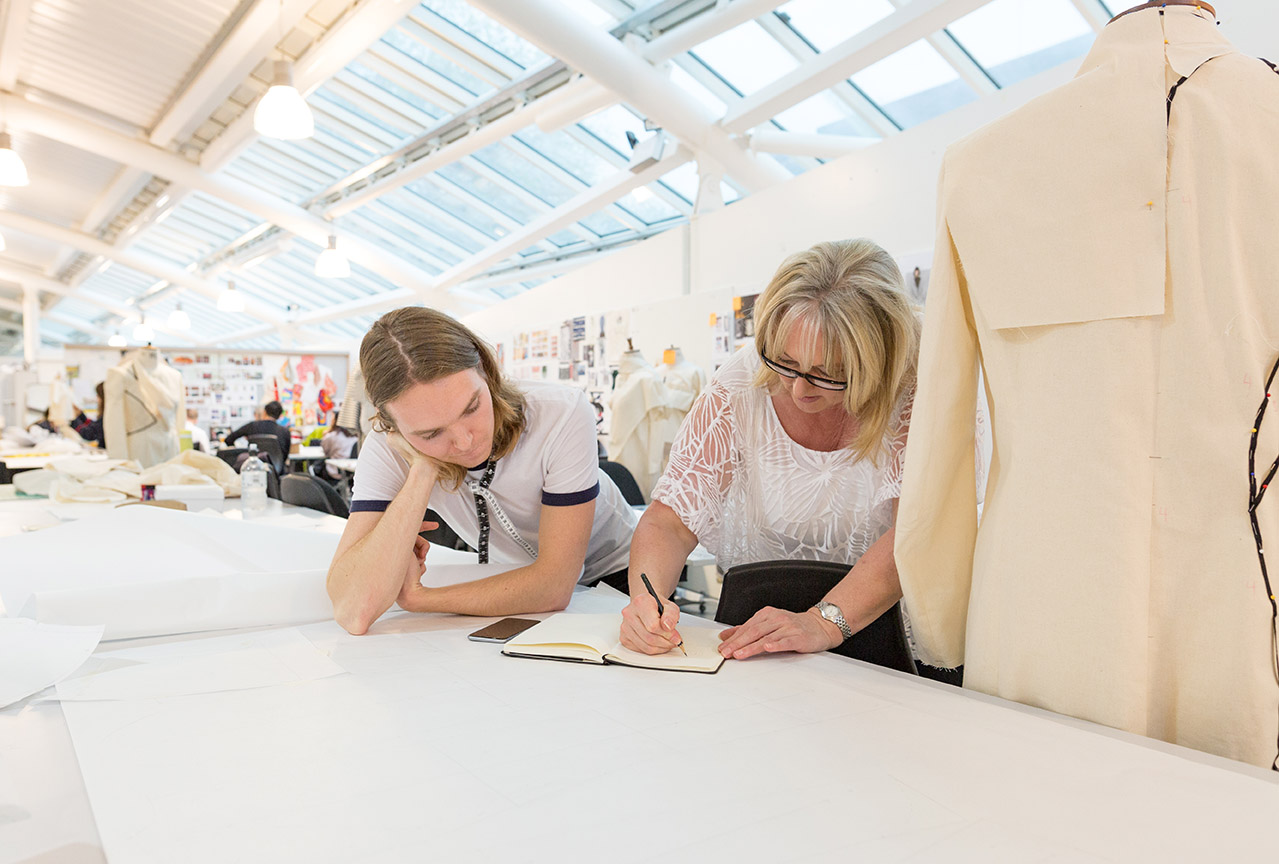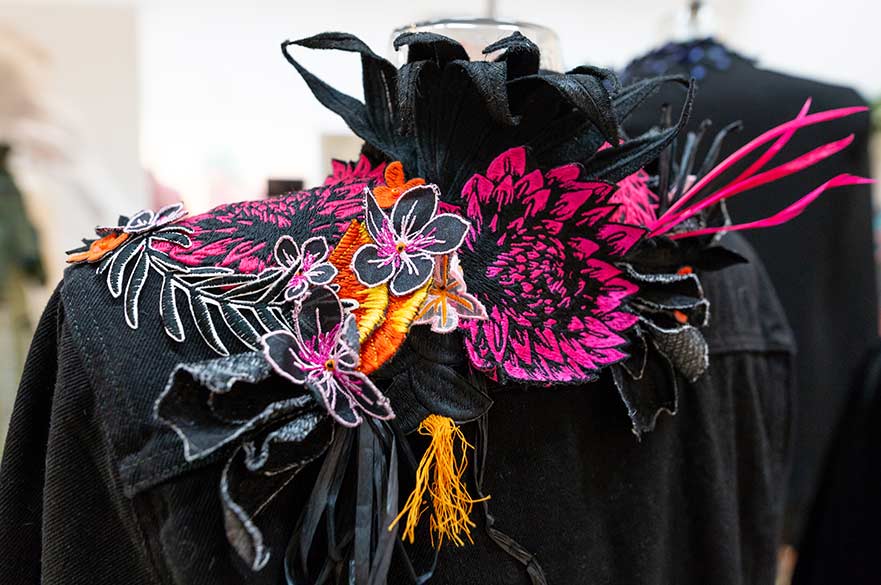Material and Technology Futures MSc
About this course
We're not just shaping the future; we're defining it.
Embark on a thrilling journey into the intersection of design, science, and technology, where you will join a collaborative community that unites minds from diverse backgrounds to tackle the challenges of today and tomorrow. Prepare to take the lead in cutting-edge technological and materials research, benefitting from valuable insights provided by the Advanced Textiles Research Group.
This course provides you with the opportunity to interrogate, speculate and propose solutions that anticipate future needs, opportunities and challenges whilst contributing to securing a sustainable future.
-
Opportunities to engage with national and international competitions, conferences and attending and/or exhibiting at trade shows.
-
Choose between 20-credit modules Professional Futures or Advancing Research Design, the latter ideal for students thinking of progressing to PhD or Professional Doctorate study.
What you’ll study
On our MSc Material and Technology Futures course, you'll delve into innovative realms of scientific development, studying beyond conventional norms. Your modules will shape you into a graduate who can navigate and apply materials, technologies, and systems thinking to tackle current and future challenges. You'll do this through exploring novel prototypes, theoretical frameworks, sustainable systems thinking within studio and workshop settings, and working alongside research and academic staff, from the ‘Advanced Textiles Research Group’ and the Department of Fashion, Textiles and Knitwear.
Culture and Collaboration
(20 Credits)
Embark on an immersive learning experience where you'll delve into the cultural context driving current and future work. Hone advanced skills in research, critical thinking, and communication while collaborating with peers on a negotiated theme contributing to a collective celebration of innovative ideas in art and design theory and practice.
Material and Technology Enquiry
(40 Credits)
In this module you will explore the scope of materials and technology to both extend and expand your knowledge and identify your future approach and direction. Reflecting on concepts, theoretical frameworks, research methods and practical experience with materials and technology, you will collaborate on novel solutions to problems and challenges.
Material and Technology Proposition and Impact
(100 Credits)
Having defined your proposal and approach you will outline your research methods and future direction. You will explore systems thinking approaches to theoretical and practical aspects of your project, as defined by your proposal. You will develop novel prototypes / theoretical frameworks / speculative outcomes, which shifts material and technological applications forward for the benefit of people, planet and profit. You will develop impactful communication methods to enable you to share your ideas with a variety of audiences and support your future direction and ambitions.
Advancing Research Design: Maximising Your Methods
(20 Credits)
This interdisciplinary module offers students an exploratory platform if they intend to use their course for further research-based studies, expand their research method knowledge, or contemplate PhD-level study. It aims to help students apply and critique diverse research methods, develop coherent research designs, and grasp the significance of their work in art and design research, fostering innovative thinking and calculated risk-taking for new knowledge creation beyond the module.
Professional Futures
(20 Credits)
The multi-disciplinary module provides an explorative platform for students who; want to use their course as the basis for further research-based study, want to extend their knowledge of research methods and methodologies to enhance their future professional practice, or are considering progression to PhD level study.
We regularly review and update our course content based on student and employer feedback, ensuring that all of our courses remain current and relevant. This may result in changes to module content or module availability in future years.
How you're taught
The timetable for this course is built around four distinct sessions.
Research workshops
- These are group sessions and are a forum for discussion and practical exercises, alongside other students on your course.
- You’ll work on tasks relating to module themes, which will give you the chance to learn about the research methodologies required at the postgraduate level.
Tutorials/Technical Supervision
- Tutorials take place in both group and individual settings. Group tutorials focus on the development of your critical thinking skills, and you’ll engage in critical discussion as a group, facilitated by academic staff. Tutorials will require you to prepare work for discussion.
Skills workshops
- These workshops are practical sessions, designed to explore the relevant practices and procedures relevant for your career in the industry.
- You’ll have the opportunity to personalise your learning experience as part of these sessions, by selecting those that meet your career aspirations. Sessions will be held in places such as our studios and facilities.
- You’ll also benefit from guest presentations, delivered by alumni and employers within the sector.
How you're assessed
Strategic formative assessment points throughout each module build students skills and confidence. The scaffolded approach allows for experimentation, and risk-taking and supports different learning styles, enabling opportunities to demonstrate skills and abilities in a wider range of contexts.
You will receive developmental feedback throughout from peer discussion and work-in-progress reviews with tutors at scheduled points in order to submit your final personal project for assessment at the end of the course.
Careers and employability
By the end of the course, students will have an understanding of the contemporary landscape of the future possibilities of their research and propositions. Some examples of potential careers are:
- Colour and Materials Manager
- Textiles and Composites Specialist
- Senior Materials Designer
- Testing and Sustainability Compliance Manager
- Research roles for KTP
- PhD in a relevant area
Campus and facilities
Our dedicated postgraduate Fashion studios are a lively, highly creative environment based in the Bonington building, a dedicated art and design hub. You can view all of our Fashion facilities on the Nottingham School of Art & Design Facilities page.
Entry requirements
UK students
Academic entry requirements: A minimum of a 2:2 honours degree, or an appropriate equivalent, i.e. a professional qualification, from a recognised British or overseas institution, in a related subject.
- Mature students with at least 3 years industry experience are also welcome to apply.
- Applicants who do not fully satisfy the general criteria will be considered if they are able to demonstrate that they are capable of successfully undertaking and completing the programme at the required standard. Eligibility may be determined by means of an interview for some applicants.
- Applicants who have been taught and assessed in languages other than English should have an English language equivalent to IELTS 6.5.
Additional requirements for UK students
There are no additional requirements for this course.
Other qualifications and experience
We welcome applications from students with non-standard qualifications and learning backgrounds and work experience. We consider credit transfer, vocational and professional qualifications, and any work or life experience you may have.
You can view our Recognition of Prior Learning and Credit Transfer Policy which outlines the process and options available, such as recognising experiential learning and credit transfer.
Getting in touch
If you need more help or information, get in touch through our enquiry form.
International students
Academic entry requirements: Bachelor’s degree grade 2:2 or equivalent qualification. We accept equivalent qualifications from all over the world. Please check your international entry requirements by country.
English language requirements: See our English language requirements page for requirements for your subject and information on alternative tests and Pre-sessional English.
Additional requirements for international students
There are no additional requirements for this course.
English language requirements
View our English language requirements for all courses, including alternative English language tests and country qualifications accepted by the University.
If you need help achieving the language requirements, we offer a Pre-Sessional English for Academic Purposes course on our City campus which is an intensive preparation course for academic study at NTU.
Other qualifications and experience
We welcome applications from students with non-standard qualifications and learning backgrounds and work experience. We consider credit transfer, vocational and professional qualifications, and any work or life experience you may have.
You can view our Recognition of Prior Learning and Credit Transfer Policy which outlines the process and options available, such as recognising experiential learning and credit transfer.
Sign up for emails
Sign up to receive regular emails from the International Office. You'll hear about our news, scholarships and any upcoming events in your country with our expert regional teams.
Getting in touch
If you need advice about studying at NTU as an international student or how to apply, our international webpages are a great place to start. If you have any questions about your study options, your international qualifications, experience, grades or other results, please get in touch through our enquiry form. Our international teams are highly experienced in answering queries from students all over the world.
Policies
We strive to make our admissions procedures as fair and clear as possible. To find out more about how we make offers, visit our admissions policies page.









